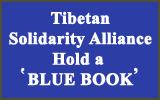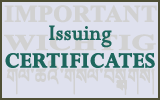Experts highlight China’s egregious human rights violations in Tibet

Geneva: Paralleling the ongoing 46th UN Human Rights Council session, the Tibet Bureau Geneva hosted a virtual side event to discuss the human rights situation in China occupied Tibet. The panel discussion was broadcasted live via Tibet TV Facebook page.
The virtual event featured three panellists: Dr. Adrian Zenz, Senior Research Fellow in China Studies at the Victims of Communism Memorial Foundation; Kate Saunders, author, writer and Tibet specialist; and Thinlay Chukki, Special Appointee for Human Rights, Tibet Bureau Geneva. The event was moderated by Kalden Tsomo, UN Advocacy Officer at Tibet Bureau Geneva.
In his discussion, Dr. Zenz uncovered Chinese policies and programs aimed at destroying Tibetan culture, identity and religious beliefs.
Speaking about the findings from his recent research on China’s labor transfer policy, Dr. Adrian Zenz, uncovered how Tibetans, in particular, pastoralists and farmers, are subjected to undergo “military-style” vocational training which is not different from the forced labor system. His study in the Chamdo Tibetan area of the Tibet Autonomous Region demonstrated that China’s move in the name of reforming “backward thinking” which include training in “work discipline,” law and the Chinese language, is carried out in military-style training supervised by People’s Armed Police, added Dr. Zenz.
Highlighting the case of Kunchok Jinpa, a Tibetan sentenced for 21-year for sharing information about the protest in his hometown with Tibetan media outside Tibet sustained a brain injury and subsequently died earlier this year, Kate Saunders said “life and death of Kunchok Jinpa tells us exactly how much China wants to prevent us from knowing anything about what is happening in Tibet.”
The case of Kunchok Jinpa also showed the “scope and scale of current crackdown and also the human cost” in passing information to and from Tibet. Kate further explained China’s shift in religion and forced relocation of Tibetan nomads, forcibly eradicating Tibetan nomadic sustainable way of life and making them dependent on state subsidies.
Categorically rejecting the recent claims by China that “Tibet is the shining example of China’s human rights progress,” Thinlay Chukki highlighted the egregious human rights violations by China in Tibet.
While discussing the agenda of the ongoing UNHRC session and the reports to be presented by the special rapporteurs, she noted the recent torture death cases of 19-year-old Tibetan monk Tenzin Nyima, 51-year-old Tibetan tour guide Kunchok Jinpa and 36-year-old Tibetan herdswoman Lhamo.
Referring to the report of the Special Rapporteur on Human Rights Defenders, whose report focuses on death threats faced by human rights defenders, Thinlay said, “the fear of deaths to the Tibetan human rights defenders arise from the Chinese Government, Chinese police and its judiciary system.”
“Perhaps what has progressed in Tibet are the innovative strategies and policies of oppression and violations of human rights of Tibetans and what shines are the tears and bloods of Tibetans. This is the human rights record of China,” concluded Thinlay.
To watch the entire session Click here.




